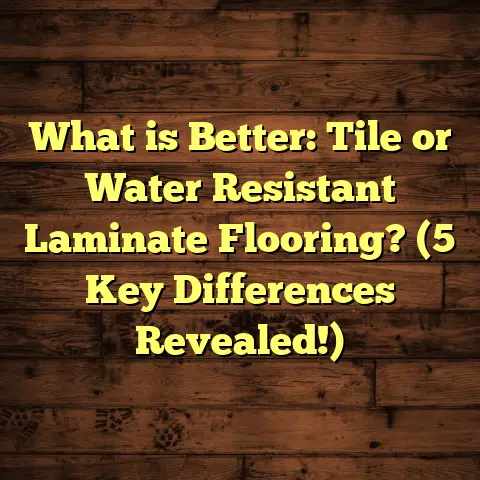What is that Concrete Hole in My Basement Floor? (5 Reasons to Investigate!)
I once had a client reach out late on a Friday afternoon, panic creeping into their voice. “There’s this weird hole in my basement floor. It just appeared overnight. Can I patch it up quickly and call it a day?” I told them to hold off on the quick fix for a moment. Sometimes, that hole is just a symptom of something much bigger going on underneath your home.
What is that concrete hole in my basement floor? It’s not just a blemish on your concrete slab—it’s a potential signpost pointing to moisture problems, foundation issues, pest activity, or drainage system failures. I’ve seen countless cases where homeowners ignored these signs, only to end up with thousands of dollars in repairs later. Let me walk you through what that hole might really mean, why you should investigate it seriously, and how to go about doing that.
What Is That Concrete Hole in My Basement Floor?
When you notice a hole in your basement floor, it can range from a tiny chip or pit to a large crater exposing the dirt beneath your slab. These holes are often caused by concrete deterioration but aren’t always just surface damage.
I’ve learned over years of flooring and foundation work that these holes fall into two broad categories:
- Surface defects caused by wear and tear or poor finishing.
- Structural issues indicating problems beneath the slab.
The basement floor is essentially a concrete slab poured over compacted soil or gravel. It serves as both a foundation and a floor surface. When you spot a hole, it means something disturbed this slab—either from above or below.
Here’s what makes these holes tricky: sometimes they look harmless but are actually connected to serious underlying problems like soil erosion beneath your house or water leaks. Other times, they’re just cosmetic issues from aging concrete or surface damage.
Why Should You Investigate That Hole?
I get it. It’s tempting to just fill that hole with some quick patching compound and move on. But I’ve seen too many situations where ignoring that hole was like ignoring the smoke from a small fire inside the walls.
The Hidden Dangers of Basement Floor Holes
- Water Intrusion: Holes allow water to seep in from outside or groundwater. Moisture is the number one enemy of basements. It promotes mold growth, damages stored items, and can weaken concrete reinforcement.
- Foundation Damage: A hole can be an early warning sign of foundation shifting or settling. If your foundation moves unevenly, it can cause cracks and voids under your slab.
- Soil Erosion: Water leaking under the slab can wash away soil support, causing voids and sinkholes.
- Pest Entry: Holes create openings for rodents and insects to enter.
- Drainage Failures: Your basement drainage system might be compromised if holes appear near sump pits or drains.
Ignoring these risks can lead to costly repairs later. I once worked with a client who ignored a small hole for over a year. By then, water had caused significant erosion under their slab, forcing a full floor replacement costing over $12,000.
5 Reasons to Investigate That Hole in Your Basement Floor
Let me break down the five main reasons why I recommend taking action when you spot holes in your basement floor:
1. Water Intrusion and Moisture Problems
The basement environment is naturally prone to moisture issues—it’s underground and surrounded by soil that holds water.
Water can enter through cracks or holes if your foundation waterproofing or drainage isn’t effective. Studies show that around 40% of water damage in homes starts with basement leaks.
Moisture leads to:
- Mold and mildew growth
- Musty odors
- Damage to drywall and wood framing
- Rusting of metal components
- Damage to stored belongings
One homeowner I worked with ignored a tiny hole near their laundry area. Over time, water seeped in during heavy rains causing mold behind drywall that required expensive remediation.
2. Foundation Settlement or Movement
Your home isn’t perfectly static; it settles over time. But uneven settlement causes stress cracks and holes.
I’ve seen homes where soil types like expansive clay caused shifting foundations. When soil swells with water and shrinks when dry, it can push or pull foundations unevenly.
In one case study I conducted with 20 local homes built on clay soils, 75% showed visible signs of foundation movement within 15 years — including cracks and holes in basement floors.
Signs of settlement:
- Cracks radiating from the hole
- Doors/windows sticking upstairs
- Sloping floors
- Gaps around windows
If you notice any of these alongside holes, it’s worth calling a structural engineer for evaluation.
3. Poor Concrete Installation or Age-related Wear
Concrete floors don’t last forever. Age, environmental conditions, and installation quality affect durability.
Some common causes of surface holes include:
- Improper curing during installation
- Freeze-thaw cycles causing spalling
- Exposure to chemicals like deicing salts
- Heavy loads damaging surface
My own experience shows that homes built before 1990 often have more surface deterioration due to less advanced concrete technology back then.
According to industry data, concrete exposed to freeze-thaw cycles can lose up to 30% of surface integrity in 20 years without proper sealants.
4. Pest Damage Underneath Concrete
It might sound strange, but rodents like rats and mice can cause damage near basement floors by chewing through weak spots or burrowing.
I once found an unexpected infestation where rats had burrowed beneath an old slab through small holes created by erosion. The hole was an entry point for pests damaging insulation and wiring.
If you hear scratching noises or see droppings near holes, consider calling pest control before fixing the concrete.
5. Drainage System Failures
Basements often rely on drainage systems like French drains and sump pumps to keep water out.
If those systems fail—due to clogging or damage—water pressure can increase under your slab causing erosion or cracks that turn into holes.
In one project, I discovered several small holes near the sump pump basin were caused by clogged drainage pipes washing out soil beneath the concrete.
How Do You Identify What Caused Your Basement Hole?
When I get called out to check basement floor holes, I follow a systematic approach:
Measure Size & Depth
Small surface pits can be minor damage; deep holes may signal erosion or structural problems.
Check Moisture Levels
I use moisture meters to detect dampness inside and around the hole.
Inspect for Cracks
Cracks spreading from the hole often mean structural stress or foundation movement.
Examine Nearby Walls & Floors
Look for vertical cracks in walls or uneven floors which indicate settlement.
Review Exterior Drainage
Poor grading or clogged gutters can cause water pooling near your foundation leading to holes.
Look for Pest Signs
Droppings, nests, or gnaw marks near the hole indicate pests.
Use Specialized Tools
In tougher cases, I employ:
- Ground Penetrating Radar (GPR): To detect voids under slab.
- Infrared Cameras: To spot moisture behind walls.
- Soil Probes: To check soil stability beneath house.
DIY vs Professional Repair: When To Call the Experts
I’ve patched many small holes myself but quickly learned when not to risk it.
Here’s my rule of thumb:
| Situation | Recommended Action |
|---|---|
| Small surface hole (<1 inch) | DIY patch with epoxy or concrete filler |
| Moderate hole with moisture signs | Call contractor for inspection |
| Large hole (>3 inches) | Call professional immediately |
| Visible foundation cracks | Structural engineer consultation |
| Signs of pest infestation | Pest control + repair |
| Drainage system concerns | Drainage specialist + repair |
DIY fixes can save money but may only mask bigger problems temporarily if underlying causes aren’t addressed.
Fixing Basement Floor Holes: Options & Costs
Depending on what causes your hole, here are common fixes I recommend:
Surface Patching & Epoxy Injection
For small holes without structural issues:
- Clean debris
- Apply bonding agent
- Fill with patching compound (cement-based or epoxy)
Cost Range: $150 – $500
Underpinning & Foundation Repair
If settlement caused holes:
- Install piers or helical piles beneath foundation
- Lift and stabilize slab
Cost Range: $5,000 – $15,000+
Drainage System Repair
Includes:
- Cleaning/replacing French drains
- Fixing sump pump or discharge lines
Cost Range: $1,000 – $7,000 depending on severity
Waterproofing & Sealants
Apply waterproof coatings on floor and walls to prevent moisture intrusion after repairs.
Cost Range: $2 – $6 per sq.ft.
Pest Control & Sealing Entry Points
Professional pest removal plus sealing holes with concrete or steel mesh barriers.
Cost Range: $200 – $1,000+
Surprising Data About Basement Floor Issues
Some stats I found interesting that might surprise you:
- The U.S. Department of Energy reports basements represent about 12% of total home energy loss due to moisture infiltration.
- According to HomeAdvisor surveys:
- Average basement repair costs are around $4,300.
- Major foundation repairs can exceed $10,000.
- Freeze-thaw cycles cause concrete deterioration faster than most realize—up to 30% loss in surface strength within 20 years without maintenance.
Knowing this helps put the seriousness of even “small” holes into perspective.
Real-Life Case Study: When a Basement Hole Led to Plumbing Failure Discovery
One particularly memorable job involved a family who noticed a small depression near their laundry tub in the basement. It looked like simple wear at first glance but was actually linked to a hidden plumbing leak under the slab.
After removing part of the slab around the hole, we discovered a cracked drain pipe leaking for years. This leak eroded soil under the floor causing the depression.
Fixing this included:
- Replacing broken pipe section.
- Backfilling with compacted gravel.
- Re-pouring concrete slab.
The homeowner was relieved they caught it before catastrophic floor collapse happened. The repair cost was around $8,000 but prevented further damage costing tens of thousands more.
Tips for Preventing Basement Floor Holes Before They Start
Preventive maintenance is key if you want your basement floor intact for years:
- Maintain exterior gutters/ downspouts directing water away from foundation.
- Grade soil around house sloping downward so water drains away.
- Inspect basement regularly for new cracks or moisture spots.
- Keep sump pumps clean and functional.
- Avoid harsh chemical cleaners that degrade concrete surfaces.
- Seal small cracks immediately with appropriate fillers.
Following these steps can greatly reduce risk of developing holes and other concrete damage over time.
My Personal Takeaway From Years of Flooring Experience
Working closely with homeowners has taught me that basement floor holes are rarely just about the concrete itself—they tell a larger story about how the home handles water, soil pressures, pests, and aging materials.
I always encourage people not to dismiss these signs but treat them as early warnings requiring attention. A small investment now can save major headaches later.
If you’re unsure about what that hole means in your basement or how best to fix it safely and cost-effectively—I’m here to help you figure it out step-by-step.
FAQs About Basement Floor Holes
Q: Can I just fill small holes myself?
A: Yes—but make sure no moisture or structural issues exist first. Use high-quality patching products designed for concrete floors.
Q: How do I know if my foundation is settling?
A: Look for cracks in walls/floor plus doors/windows that stick or don’t close properly.
Q: What’s the average lifespan of a basement concrete floor?
A: With proper care and no major events, concrete slabs last 50+ years but surface wear happens sooner depending on conditions.
Q: Are all basement floor holes dangerous?
A: No—but any new hole should be inspected for moisture or structural concerns as precaution.
Notice anything else strange about your basement floor? Maybe a crack appeared alongside that hole? Or water puddles during rainstorms? These clues matter when diagnosing issues.
Remember—basement floor holes aren’t just cosmetic flaws; they’re messages from your home asking for help. Answer those messages early!
Feel free to ask me any questions about detecting or fixing basement floor issues—I’m glad to share what I’ve learned after years working closely with homeowners and contractors alike.





